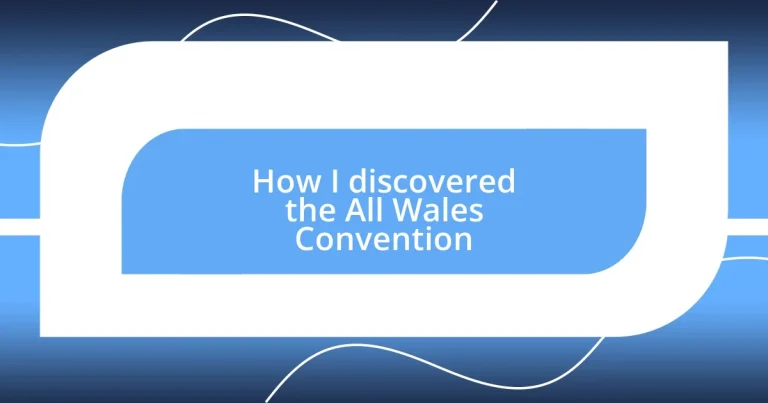Key takeaways:
- The author’s fascination with Wales began in childhood, inspired by its myths and the warmth of its people, fostering a deep appreciation for its culture and history.
- Researching Welsh governance revealed the evolution from tribal systems to the establishment of the National Assembly, highlighting key legislative milestones that empowered Welsh representation.
- Experiencing the All-Wales Convention emphasized the significance of community engagement and storytelling, igniting a passion for advocating for Welsh identity and governance.
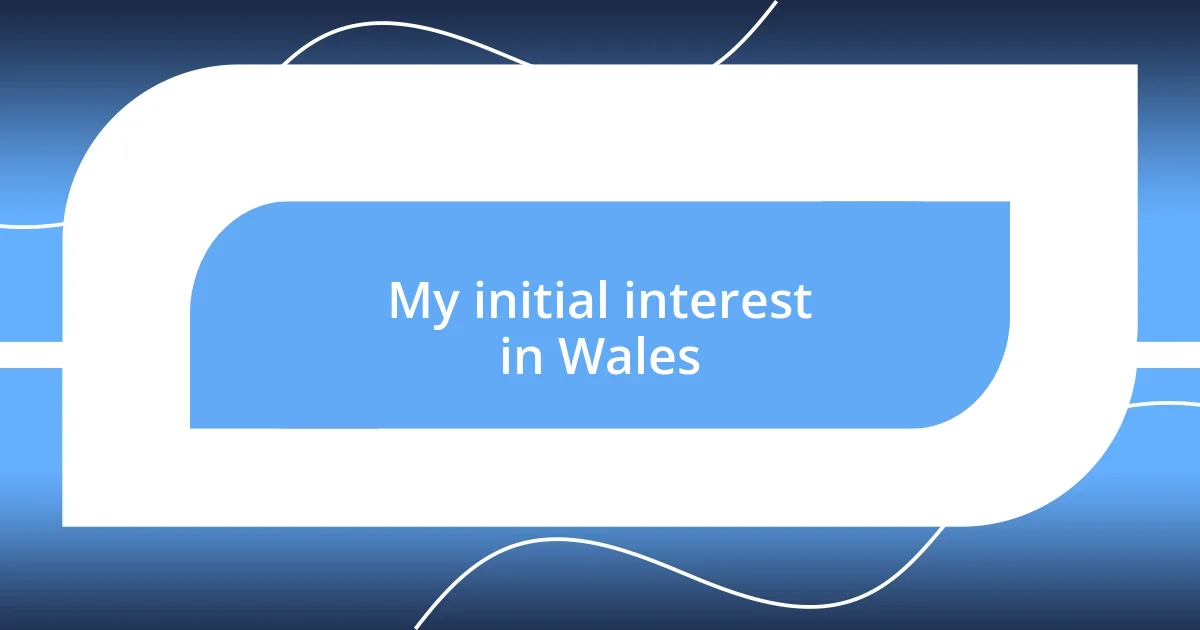
My initial interest in Wales
Wales has always held a certain charm for me, stemming from childhood trips with my family. I remember standing on the rugged cliffs of Pembrokeshire, feeling the wind whip through my hair while listening to tales of ancient castles and myths. Those stories sparked an insatiable curiosity about its history and culture that has stuck with me ever since.
I often find myself reminiscing about a school project where I presented on Welsh folklore. Diving into tales of dragons and knights was like stepping into a different world. I still wonder—how do these legends shape the identity of the people who call Wales home? They certainly left a mark on my understanding of the rich tapestry that weaves the culture together.
It wasn’t just the scenic beauty or the exciting lore that attracted me; it was also the warmth of the Welsh people. I recall meeting a local artist during a visit to Cardiff who shared her passion for capturing the essence of the countryside in her paintings. How could I not be inspired by someone who looked at the world around her with such admiration? It was moments like these that truly deepened my appreciation for Wales and its multifaceted spirit.
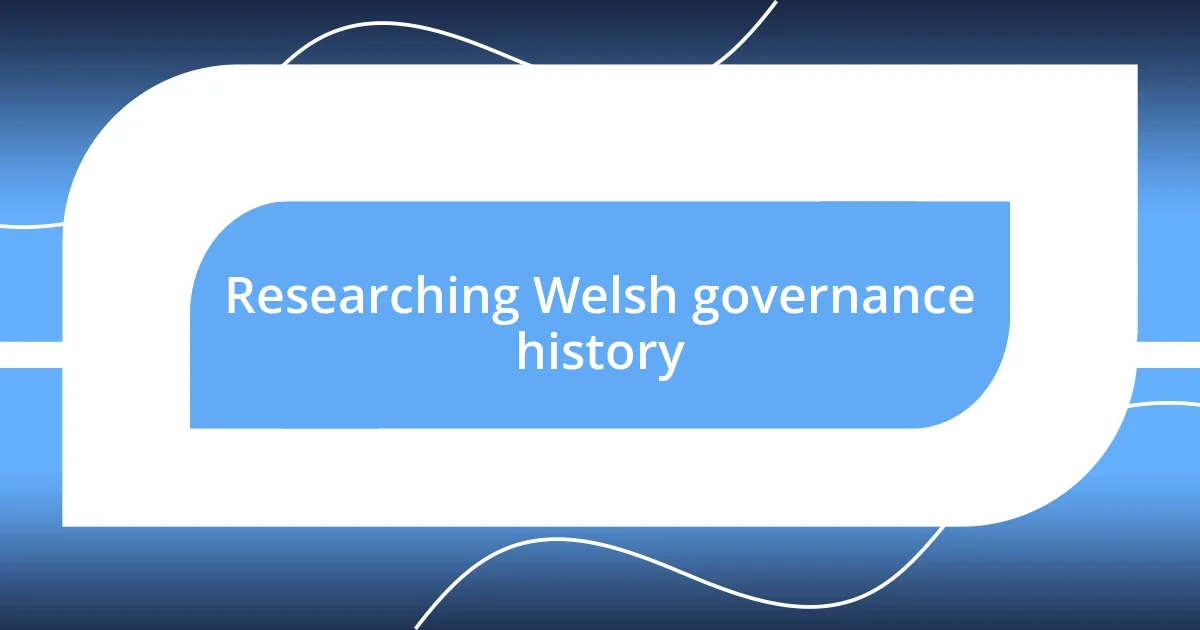
Researching Welsh governance history
Researching the history of Welsh governance opened my eyes to the fascinating evolution of political structures in Wales. I distinctly remember pouring over old texts and documents at my local library, feeling a thrill as I discovered the intricate journey from the ancient tribal systems to the establishment of the National Assembly for Wales. Each piece of historical evidence felt like a puzzle, slowly revealing the story of a nation striving for its own voice.
- The Laws in Wales Acts (1535-1542) integrated Wales into the English legal system.
- The Government of Wales Act (1998) established the National Assembly for Wales, allowing greater self-governance.
- The 2011 referendum further enhanced the Assembly’s powers, allowing for legislative devolution.
As I delved into these changes, I couldn’t help but feel a connection to the figures who fought for Welsh representation. Each reform was a step toward recognizing the unique identity of Wales. It was like hearing the echo of passionate voices from the past urging for recognition and rights. This realization helped me appreciate not just the political shifts, but the emotional journey underpinning them.
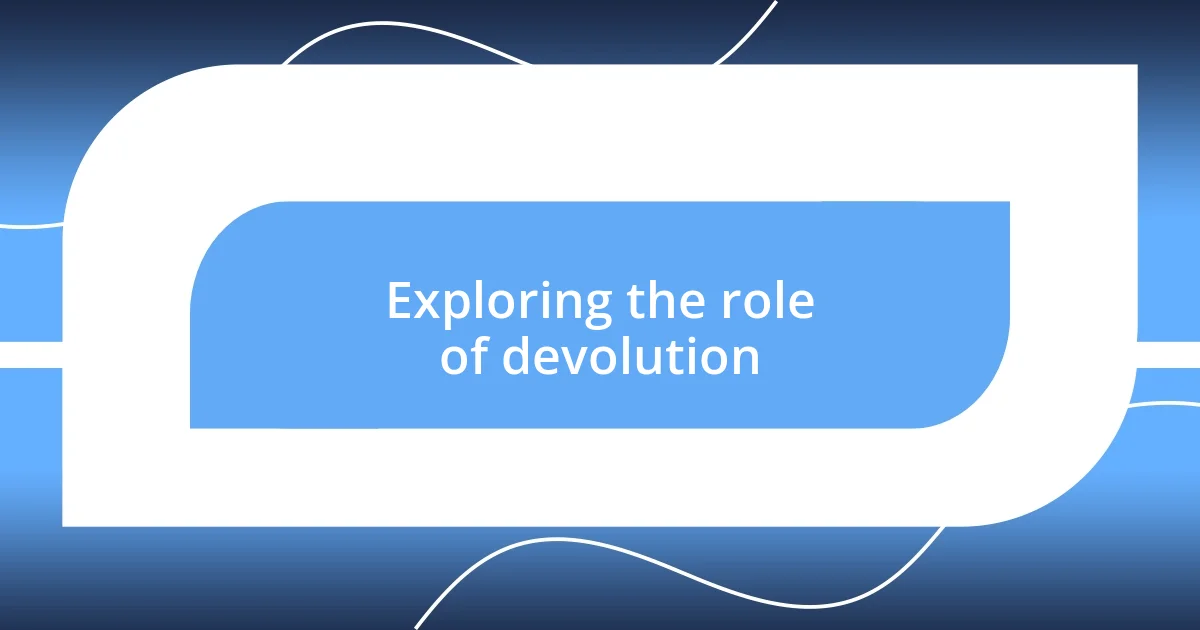
Exploring the role of devolution
Devolution has played a pivotal role in shaping the modern identity of Wales. I recall attending a public forum in Cardiff where local leaders passionately discussed the implications of devolution on community engagement. Hearing firsthand accounts of how local governance empowered citizens was profoundly moving. It made me realize that this change wasn’t merely abstract; it tangibly affected lives.
When I think about Welsh devolution, I often reflect on how it has given the people a stronger voice in decisions that impact their daily lives. The establishment of the Welsh Parliament (Senedd Cymru) was a game-changer. I vividly remember my friend, a young politician, sharing her excitement as she campaigned for issues relevant to her community, telling me, “Finally, we can make decisions that directly reflect our needs.” That enthusiasm was contagious, reinforcing how devolution isn’t only about politics—it’s about real people with real aspirations.
Looking at the role of devolution in Wales, it’s clear that it has forged a distinct pathway toward self-governance. I was struck while visiting a local museum showcasing the collaborative efforts that marked the devolution process. The stories behind those efforts felt like a testament to resilience and collective sacrifice. It’s inspiring to think that these historical movements laid the groundwork for a future where Welsh culture and governance flourish side by side.
| Aspect | Details |
|---|---|
| Key Acts | Laws in Wales Acts (1535-1542), Government of Wales Act (1998), 2011 Referendum |
| Empowerment | Allows citizens a greater voice in local governance |
| Community Engagement | Encourages participation in political processes |
| Cultural Identity | Promotes and preserves Welsh cultural heritage |
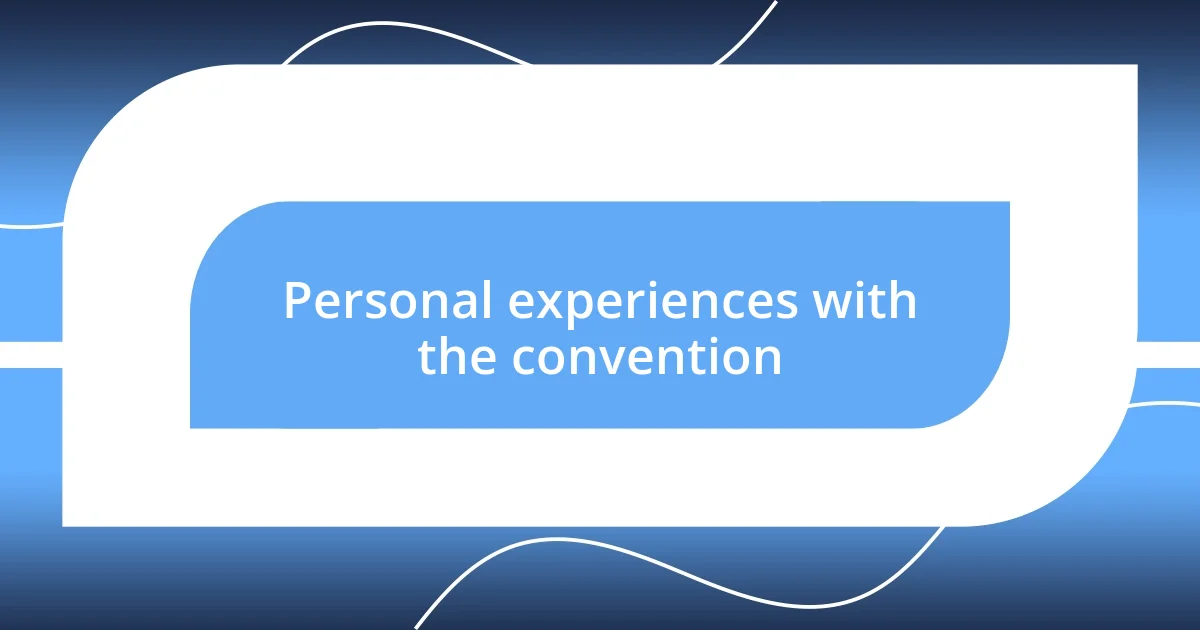
Personal experiences with the convention
Attending the All-Wales Convention was an eye-opener for me. I vividly remember sitting among a diverse crowd, soaking in the discussions about the future of Welsh governance. It struck me how passionately people engaged with the topic. A man next to me shared his family’s history of activism in Wales. His connection to the cause resonated deeply with me—I wondered, how many generations had longed for a voice like this?
That day, I felt an overwhelming sense of hope and determination. I couldn’t help but draw parallels to my own experiences with community organizing. It reminded me of the time I helped coordinate a local event to raise awareness about Welsh language rights. The enthusiasm in that room at the convention mirrored the spirit I felt then – a collective aspiration to build a strong identity and ensure our voices were truly heard. Did I realize at that moment how significant this convention was for the next phase of Welsh self-governance? Absolutely.
Looking back, the convention also highlighted something crucial: the power of storytelling. I remember a speaker vividly recounting his journey to advocate for improved educational policies in Wales. His story wasn’t just about policies; it was about a child’s dreams and struggles, echoing what many of us face. I couldn’t help but ask myself, how can we continue to share these personal narratives to inspire change? Being part of that gathering ignited a passion in me to contribute more actively to the ongoing conversation about Wales’ future.












